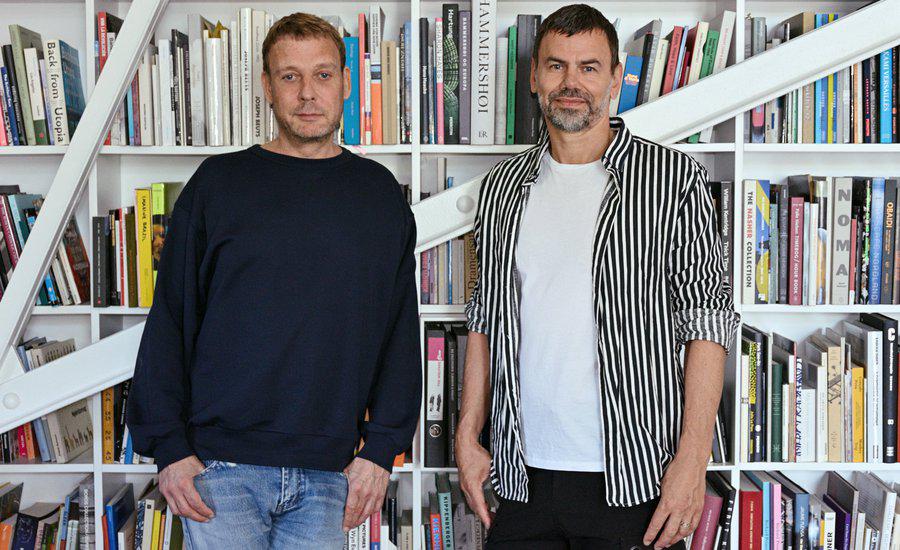
Elmgreen and Dragset on Unquestioning Love
The acclaimed fine art duo recall the AIDS crisis and describe the work they have contributed to the New York City AIDS Memorial sale at Christie’s
Few artists have engaged with the long shadow of the AIDS Crisis with quite the same rigor as Elmgreen & Dragset. The Nordic art duo’s 2015 exhibition, Stigma, featured a series of works entitled Side Effects. These consisted of a series of tall glass jars – in size and shape recalling an apothecary’s carboy, or a funeral urn – each filled with the same pigments used to coat the latest generation of HIV medicines.
They extended this motif further in their 2019 exhibition, It’s Not What You Think It Is, at the Blueproject Foundation in Barcelona, by building a fake boiler room, in which the pipes were painted the same light pastel colors.
These pieces join a long line of other artworks, such as Elmgreen & Dragset’s 2008 Memorial to the Homosexuals Persecuted Under the National Socialist Regime, in Berlin; their 2010 sculpture, Gay Marriage; and their Queer Bar, installation, first created in 1998, which speak to the distinct experiences of gay men and women around the world.
With this in mind, it should come as no surprise to learn that the artists have contributed a work to Unquestioning Love, a high-profile sale featuring a truly incredible selection of contemporary art, at Christie’s this week to benefit the New York City AIDS Memorial.
Ahead of the sale, which takes place on 9 and 12 November, at Christie’s in New York, Elmgreen & Dragset share their thoughts on the artwork, and the cause it benefits.

Could you tell us a little bit about the artwork you donated? Side Effects, No. 14 (2015) is a sculptural work consisting of three hand-blown glass jars filled with the pastel-colored food pigments that are used to coat pills in recent generations of HIV medicines, such as Truvada, Atripla, Stribild and Isentress. The pastel colored pigments—peach, pink and light blue— look harmless, attractive, and even inviting like candy, however their innocent appearance only camouflages the actual toxicity of these serious medications. The three vases in this artwork, which is part of a bigger series of works named Stigma, reflect a specific combination of pills that you, as a patient, would take daily (or in some cases multiple times a day). They are displayed on a low plinth made of stainless steel, which is reminiscent of both the sterile interior of a laboratory and Donald Judd’s minimalist aesthetics. The uniform shape of these hand-blown vases might recall something between an urn or a candy jar but slightly bigger in size.
During the 1990s, AIDS was a much-debated subject in the work of many prominent artists, but today it appears less frequently in contemporary art and public information campaigns on the topic are also less common.
Do you have an experience or memory associated with the AIDS epidemic that affected you personally? Our generation of gay men’s early sexual experiences were overshadowed by the fear of AIDS until antiviral medications became more efficient. Today, PrEP [Pre-exposure prophylaxis, medication taken to prevent the spread of HIV] has certainly helped to decrease the number of new HIV cases – but PrEP is costly and therefore not accessible for all.
What motivates you to donate your work to a charitable endeavour such as this? It is extremely important to remember the huge number of those who died partly because of neglect from government policies. It is a black chapter in our recent history – a genocide outside times of war - and something that should not be forgotten.

Have you ever visited the AIDS memorial? If so, what effect did it have on you? Yes, we visited not long after it was inaugurated and were honored to have our names mentioned alongside many others due to our first contribution. It was very emotional to see the memorial completed and we think the location is perfect, in close proximity to the LGBTQIA+ community center in West Village where you also have the amazing Keith Haring mural.
The memorial features a plaza engraved with sections from Walt Whitman’s Song of Myself - chosen by Jenny Holzer. Is there a poem, song or work of art that brings to mind the crisis for you personally? Sometimes It Snows in April by Prince. And Arthur Russell's music.
Many artists died from AIDS. Is there one in particular whose passing particularly saddened you? Michael met Félix Gonzáles-Torres in Copenhagen in 1992. He was such a significant inspiration but just a few years later he died in Miami of AIDS.
For more on Elmgreen & Dragset go here; for more information on Unquestioning Love go here.